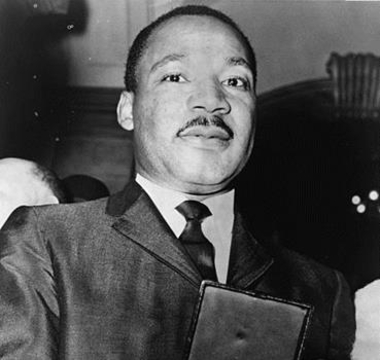Martin Luther King's LGBT legacy

by Rob Howard
Associate Editor
Late in the evening of April 4, 1968, the nation and the world was stunned by the news that Rev. Martin Luther King, Jr. had been assassinated in Memphis. A soaring voice for freedom and equality, King had emerged on the national scene leading the 1955 Montgomery, Alabama bus boycott. In 1963, he gave his “I Have a Dream” speech at the March on Washington. His life was dedicated to raising the oppressed, to help those wounded by our society and culture, and to fight for freedom for all.
Sometimes we wonder what Martin Luther King, Jr. would have thought of the push for LGBT rights, or the fight for marriage equality. What did his life, and his death, mean for the struggle of gay men, lesbians, bisexual and transgender people for their equality?
The big civil rights effort of the 1950’s and 60’s was to overcome the legacy of slavery and a bitter civil war in our country, and bring true equality to blacks and other minorities. In those days, few people talked about homosexuality. An exception was Bayard Rustin, an openly gay man who had been a leading activist of the early civil rights movement. He was an advocate for nonviolent resistance, and taught Martin Luther King many of the principles of nonviolent civil disobedience. He became the chief organizer of the 1963 march. And he was marginalized for his sexual orientation.
At that march, organized by a gay man, Rev. King’s speech was a turning point for many Americans. We often focus on the “I have a dream….” part of his remarks. But for fledgling gay activists, many of whom were already involved in the fight for racial justice; other parts were just as electrifying.
King remarked, early in the speech, “We have also come to this hallowed spot to remind America of the fierce urgency of now. This is no time to engage in the luxury of cooling off or to take the tranquilizing drug of gradualism. Now is the time to make real the promises of democracy.”
Frank Kameny, an early gay leader in the ‘homophile movement’ of the 50’s, agreed. According to Michael G. Long, in his book Martin Luther King Jr., Homosexuality, and the Early Gay Rights Movement, “Kameny opposed moderation in the homophile movement, insisting that gays should protest for freedom, that they should protest now, and that direct action campaigns – along with other confrontational tactics aimed at policy makers – could be successful in advancing gay rights sooner rather than later. The civil rights movement led by King offered enough evidence to back his views.”
Many in that generation were involved in the struggle for racial equality long before our own gay identity began to emerge in our psyche. But the lessons learned in that fight were lessons applied to our own battle to gain recognition, to be accepted as equal citizens, to come out of the closet of despair, into the light of freedom and equality.
50 years after the speech, King’s words and our dreams for equality continue to work together to advance both human and civil rights. Gay rights have been incorporated into the human rights movement.
The Rev. MacArthur Flournoy, who directs faith partnerships and mobilizing at the Human Rights Campaign, said the inclusion of gay rights in the larger civil rights movement has been transformative.
"We see human rights and civil rights as linked. And so our commitment is to stand with others on issues of justice and, really, on issues of equality," he said. "LGBT equality, in our minds, is consistent with many other justice issues, so it's important that we're present."
For LGBT people, the fight is not yet over for the values of equality King stood for, says Darlene Nipper of the National Gay and Lesbian Task Force. Most states ban gay marriage and other civil rights for gay couples.
As a black woman and lesbian, Nipper said she will be able to bring her whole self to the 50th anniversary of the March on Washington, now that the gay rights movement is not a separate cause pushed to the side.
"It's just a powerful, palpable, beautiful progression toward the kind of society that Martin Luther King Jr. talked about when he was talking about that truly beloved community," she said. "That's really reflective of inclusion for all of us."
We don’t know for sure what Martin Luther King, Jr. thought of LGBT rights, or even if he thought about them at all. His widow, Coretta Scott King believed she knew, though. In March, 1998, she said, “I still hear people say that I should not be talking about the rights of lesbian and gay people and I should stick to the issue of racial justice….But I hasten to remind them that Martin Luther King Jr. said, ‘Injustice anywhere is a threat to justice everywhere.’”
She continued, “I appeal to everyone who believes in Martin Luther King Jr.’s dream to make room at the table of brother- and sisterhood for lesbian and gay people,” she said.
The great American human rights icon may never have mentioned gay rights, but his words and actions, his life and his death, provided the experience, and the electricity, to drive forward the fight for LGBT rights, at the same time we continue the battle for all human rights.
As we honor Dr. King this month at the holiday dedicated to his memory, we can take inspiration in that fight from these words of Dr. King, inscribed on his Memorial in Washington, D. C.: “The arc of the moral universe is long, but it bends towards justice.”
AP writer Brett Zongker, in his August 21, 2013 AP story “Civil rights includes gays 50 years after march,” contributed to this article.
The Gayly – January 14, 2014 @ 11:05am





